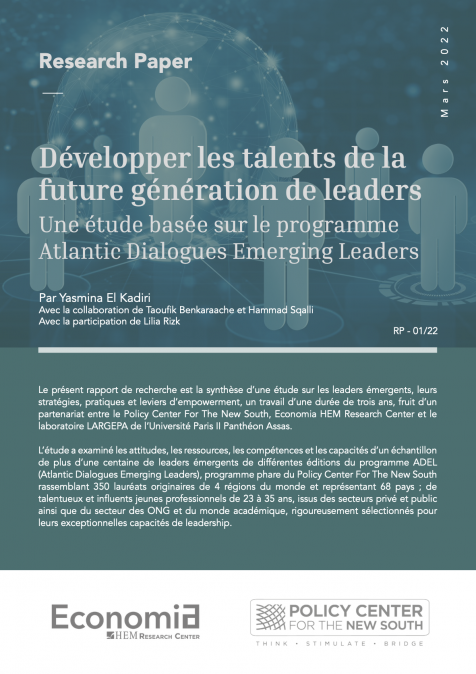Publications /
Opinion
Born and raised in Romania, but of Hungarian ethnicity Scarlett Varga is since January 2020 the head of development at Bruegel. In other words, she is in charge of the fundraising strategy of this leading European economics think tank, launched in 2005 in Brussels.
Her position is highly strategic, as she is member of the organisations’ management and contributes to a 6 million Euros yearly budget, safeguarding Bruegel’s core values of independence and transparency.
Leading a team of six talented young professionals, her mission is to tap into private and public sources, targeting multinational corporations (the likes of the GAFAM – namely Google, Amazon, Facebook, Microsoft and Apple –Morgan Stanley or Shell), central banks and governments, and grants from European Union institutions. Through dynamic relationships with policymakers at every level, Bruegel has also established itself as a vibrant laboratory of ideas.
The Coronavirus crisis is putting her and her team to the test. “I just stepped in the labour market during the international financial crisis of 2008, and this is the second crisis my generation is facing in its productive life. At Bruegel, we are bringing data and potential solutions on what leaders of today have to act fast on, and not lose so much time as in 2008”.
Proposing a position she could fill
Scarlett Varga, who is also a passionate dancer, landed her first contract with Bruegel in 2014 with a broken toe and a lot of luck. During her interview with Bruegel’s director she was asked to propose a position she could fill, to search for new ways of fundraising. “I could see the potential of working more with private foundations, such as the Wellcome Trust or the Compania de Sao Paulo, to address social issues, to see where our common objective lies and how we can grow together”. In 2018, she became the Deputy Head of Development. She is passionate about the impact of the research published by Bruegel, dealing with real and immediate issues such as the Greek crisis and Brexit, but also long term challenges of climate policies or digitalization in the workplace.
She has come a long way, though, having begun her studies in the IT sector. “In Romania, it was seen as the job of the future when I started studying. After 4 years of IT, I realized this was not for me: I can’t sit next to a computer seven days a week. I need a team and constant movement”. She started Economics in 2006 in Romania, and got a scholarship to follow a double degree of Economics and Business and Marketing studies in the UK. When she arrived in Canterbury in 2009 with 500 pounds in her pocket, she was already attracted to EU economics, and was later dreaming of establishing herself in Brussels, the capital of Europe.
Which she did, in 2010. She ended her higher education with an International Master of European Studies at the Université Catholique de Louvain. After more than two years of work in Brussels, as a Junior Project Officer and Project Officer at the European Photovoltaic Industry Association (SolarPower Europe), she decided to travel alone for nine months in Latin America in 2013.
A nine-month tour of Latin America
Against all the friendly advice she was getting on how she might “ruin” her career, she followed her inner voice. She stayed in almost every country, except Venezuela, reaching out for immersion in local life and culture through volunteer activities in the non-profit sector. In Colombia, she worked for a charity taking care of disadvantaged children, and in Chile, in the renewable energy sector. This long trip was a “life school” for her: “In Western Europe people lose track of how to be happy with what they have. I met so many nice people in Latin America, with so much compassion and kindness despite their hardships. I felt our societies are sometimes getting lost in constant status anxiety and self pity”.
Co-founder of the Brussels Binder database in 2016, she has co-created a platform where female experts can be more visible and get more chances to participate in public debates.
“In my job, which is all about partnerships, I enjoy conversations and understanding how different cultures are working”, she explains. That’s why she applied to the Atlantic Dialogue Emerging Leaders (ADEL) Program in 2018, and was selected. Besides making “great friends in Marrakech”, she thinks “the length of the ADEL programme really gives you the time to understand each other and have a genuine curiosity payoff”. She was also interested to see how the youth is invested in and invited to “deliver”, sharing thoughts, projects and advice.
Attracted to the Spanish culture and dancing world, Scarlett thinks of Spain as a possible home someday, to open a rustic hacienda, welcome people in a warm environment and host a colorful variety of cultural events from book presentations, to dance seratas and musical stunts. While acknowldedging her generation is “lacking the dreams, since Internet made our life buzzling with short-term challenges”, she explains that her “dream goes with no search of impact or income, but something just very peaceful”.
You can consult Scarlett’s Portrait along with others on the ADEL Portrait page








